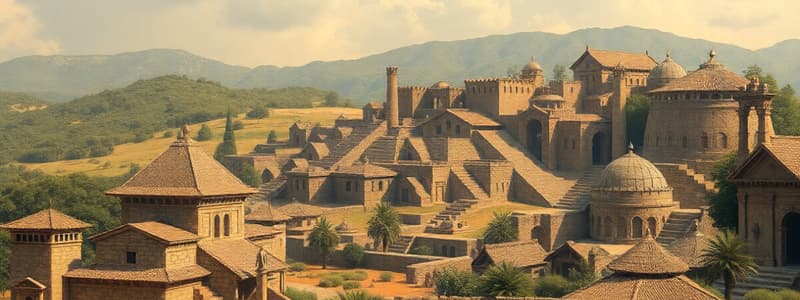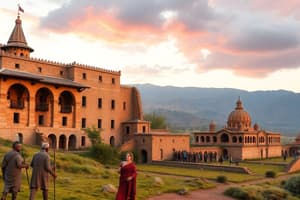Podcast
Questions and Answers
What period marks the development of writing systems?
What period marks the development of writing systems?
- Early Modern History
- Medieval History
- Ancient History (correct)
- Prehistoric Period
Which empire is not considered a major empire during Ancient History?
Which empire is not considered a major empire during Ancient History?
- Ottoman Empire (correct)
- Roman Empire
- Maurya Empire
- Persian Empire
What is primarily studied in historiography?
What is primarily studied in historiography?
- The events of the past
- The methodologies used by historians (correct)
- The artifacts of ancient civilizations
- The political structures of empires
Which of the following statements about the Medieval History period is false?
Which of the following statements about the Medieval History period is false?
What significant change occurred during the Early Modern History period?
What significant change occurred during the Early Modern History period?
Which of the following is a method of historical study?
Which of the following is a method of historical study?
What was a primary consequence of the Industrial Revolution?
What was a primary consequence of the Industrial Revolution?
Whose accounts are primarily featured in primary sources?
Whose accounts are primarily featured in primary sources?
Flashcards are hidden until you start studying
Study Notes
Overview of History
- History is the study of past events, particularly in human affairs.
- It encompasses a broad range of topics including cultures, societies, economies, politics, and interactions.
Periodization of History
-
Prehistoric Period
- Time before written records.
- Includes the Stone Age, Bronze Age, and Iron Age.
-
Ancient History (circa 3000 BCE - 500 CE)
- Development of writing systems (e.g., cuneiform, hieroglyphics).
- Rise of early civilizations: Mesopotamia, Ancient Egypt, Indus Valley, China.
- Major empires: Roman Empire, Persian Empire, Maurya Empire.
-
Medieval History (circa 500 - 1500 CE)
- Feudalism and the influence of the Church in Europe.
- The Byzantine Empire and the rise of Islam.
- Mongol conquests and the Black Death.
-
Early Modern History (circa 1500 - 1800 CE)
- Renaissance, Reformation, and Enlightenment movements.
- Age of Exploration and colonialism.
- Scientific Revolution and the rise of nation-states.
-
Modern History (circa 1800 - Present)
- Industrial Revolution and its socio-economic impacts.
- World Wars and significant global conflicts.
- Cold War and the emergence of superpowers.
- Globalization and technological advancements.
Key Historical Concepts
- Cause and Effect: Understanding the reasons behind historical events and their consequences.
- Change and Continuity: Analyzing what has changed over time and what has remained the same.
- Perspective: Recognizing that history can be interpreted in different ways depending on viewpoint.
- Historiography: The study of how history is written and the various methodologies used by historians.
Methods of Historical Study
- Primary Sources: Original documents, artifacts, or eyewitness accounts (e.g., letters, photographs, official records).
- Secondary Sources: Analyses or interpretations based on primary sources (e.g., books, articles).
- Archaeology: Study of human history through excavation and analysis of artifacts.
- Oral History: Collecting and studying personal accounts of historical events.
Importance of History
- Provides insights into human behavior and societal development.
- Helps understand cultural heritage and identity.
- Facilitates informed citizenship by learning from past successes and failures.
Overview of History
- History is the study of past events, particularly in human affairs.
- It encompasses a wide range of subjects, including cultures, societies, economies, politics, and interactions.
Periodization of History
Prehistoric Period
- Predates written records.
- Includes the Stone Age, Bronze Age, and Iron Age.
Ancient History
- Development of writing systems such as cuneiform and hieroglyphics.
- Rise of early civilizations in Mesopotamia, Ancient Egypt, Indus Valley, and China.
- Major empires include the Roman Empire, Persian Empire, and Maurya Empire.
Medieval History
- Feudalism and the influence of the church in Europe.
- The Byzantine Empire and the rise of Islam.
- Mongol conquests and the Black Death.
Early Modern History
- Renaissance, Reformation, and Enlightenment movements.
- Age of Exploration and colonialism.
- Scientific Revolution and the rise of nation-states.
Modern History
- Industrial Revolution and its socio-economic impacts.
- World Wars and significant global conflicts.
- Cold War and the emergence of superpowers.
- Globalization and technological advancements.
Key Historical Concepts
- Cause and Effect: Understanding the reasons behind historical events and their consequences.
- Change and Continuity: Analyzing what has changed over time and what has remained the same.
- Perspective: Recognizing that history can be interpreted in different ways depending on viewpoint.
- Historiography: The study of how history is written and the various methodologies used by historians.
Methods of Historical Study
- Primary Sources: Original documents, artifacts, or eyewitness accounts (e.g., letters, photographs, official records).
- Secondary Sources: Analyses or interpretations based on primary sources (e.g., books, articles).
- Archaeology: Study of human history through excavation and analysis of artifacts.
- Oral History: Collecting and studying personal accounts of historical events.
Importance of History
- Provides insights into human behavior and societal development.
- Helps understand cultural heritage and identity.
- Facilitates informed citizenship by learning from past successes and failures.
Studying That Suits You
Use AI to generate personalized quizzes and flashcards to suit your learning preferences.



